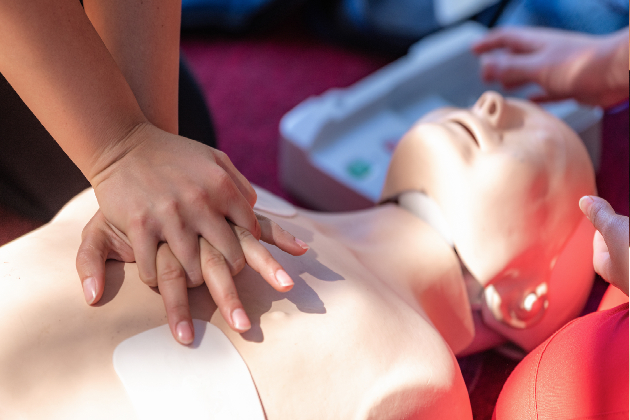How do you feel when delivering CPR?
Ciara: When you're in the throes of cardiopulmonary resuscitation (CPR), you don't think about much else apart from your role in that – you go into autopilot mode, revisiting all the training you’ve received over the years. It can be distressing too, depending on the environment you're in, there could be other things going on. For example, the patient could be bleeding.
Emotions can be different in different scenarios. If you’ve never met the patient, it can be easier to work in autopilot mode. When you’ve been working with the patient for some time, it’s more difficult to manage because you have a relationship with them. We’re very good as professionals in setting that aside, but afterwards, in my experience, those are the patients that you reflect on more.
It's also very physically demanding, and when you've done it for a couple of cycles, it's really tiring.
It’s incredibly stressful, regardless of the scenario
Suman: The emotions can be really varied, depending on the situation. If you’re attending the cardiac arrest of a patient who’s been in your care for weeks, you tend to have a relationship with them and have formed an emotional attachment – you know their family and friends. Those feelings will be different to if a stranger collapses on the street and you happen to be nearby to help them.
If you’ve got a patient whose health is deteriorating, someone who's been critically unwell, cardiac arrest may be anticipated. You may have started to put plans in place, preparing equipment around the patient in case it does happen, and this can remove a certain amount of stress.
Nobody likes to be in that situation of performing CPR. It’s incredibly stressful, regardless of the scenario.
What are some of the emotions you go through post-delivering CPR?
Ciara: Afterwards, I sometimes question if I’ve harmed the patient, as CPR is physically demanding on them too. Unfortunately, that's something that can happen. There have been occasions where I’ve wondered if I did a good enough job. Could somebody else have done it better? I think those thoughts will sometimes go through your mind, but as you become a more experienced nurse, you become more comfortable in your own ability and understanding of the situation. For example, if we fail to resuscitate a patient, we have a bad outcome but it's not necessarily an individual fault.
I remember my first CPR as a newly qualified nurse, and it wasn't successful for me, that patient didn't survive. I thought about that for a very long time afterwards. It stays with you.
Suman: If it’s been successful, that's always a relief. However, the definition of successful cardiac arrest is quite a difficult to define. If you’ve managed to get somebody's heart restarted, that doesn’t necessarily mean that the outcome is good, because cardiac arrest can lead to a hypoxic brain injury, due to the brain being starved of oxygen.
A patient also might not gain consciousness after CPR, but they're alive in the sense that their heart is pumping. We might have to intubate them, put them on a ventilator and take them to intensive care. So, after getting the pulse back, this doesn't necessarily mean that you can just take a deep breath and relax.
Nobody likes to be unsuccessful, and as nurses, we’re trained to help people save lives. That's our job, and if we don't achieve that there can be this sense of failure.
Get support
If you’ve been affected by anything you've read in this article, please get in touch with RCN’s counselling service.
Tell me more about debriefs, and why they’re so important.
Ciara: Post-cardiac arrest, we’ll gather everyone who was involved and have a 10-15 minute debrief. We’ll discuss what went well and what didn’t, did we have any issues with equipment or other concerns? We’ll talk about anything we could’ve done better – are there any processes we can put in place to make it slicker for next time? We always want to acknowledge people who’ve done well and reassure people too. That’s what we call our ‘hot debrief’.
Our ‘cold debrief’, which is more of an emotional support discussion, will happen a couple of weeks afterwards. We talk about how we’re feeling after the event and often use these sessions to identify those who might be struggling and signpost them to support.
You can do everything right, and still not be successful
Suman: A debrief is so important. During the discussion, the team leader should make an announcement to say if any members of the team would like to speak one-on-one, that option is there.
I would always advise nursing staff or other members of the team involved who've gone through that traumatic situation to talk to their colleagues and line manager and through what happened. We should all be better at saying “well done” to the team, whether the outcome was successful or not. We don’t praise our staff enough.
You can do everything right, and still not be successful. We must remember that.
Do you remember your first experience of CPR as a nurse?
Ciara: I was on placement on a ward, and I had a patient who was deteriorating. The nurse I was working with had called the medical team to come and see the patient. Within minutes, they went into cardiac arrest.
I remember standing there and just looking at her flying into action, starting CPR, pulling the crash bell and seeing all the other nurses on the ward drop everything to help. I found it incredibly intense, and I didn’t want to look after a while. I’d never seen anything like that before. You see it on the TV and in films, but it’s not the same.
Suman: It's not something you forget. I was a student nurse on a night shift on a ward, and it wasn't one of my patients. It was about 3am and I heard the crash bell go. You get this surge of adrenaline when you hear the bell. I rushed in and delivered my first chest compression. It was a frightening experience to see my first patient with no pulse.
Ciara is a critical care matron and Chair of the RCN Critical Care and Flight Nursing Forum. Suman is a consultant nurse and advanced critical care practitioner and also RCN Professional Lead for Critical Care.








